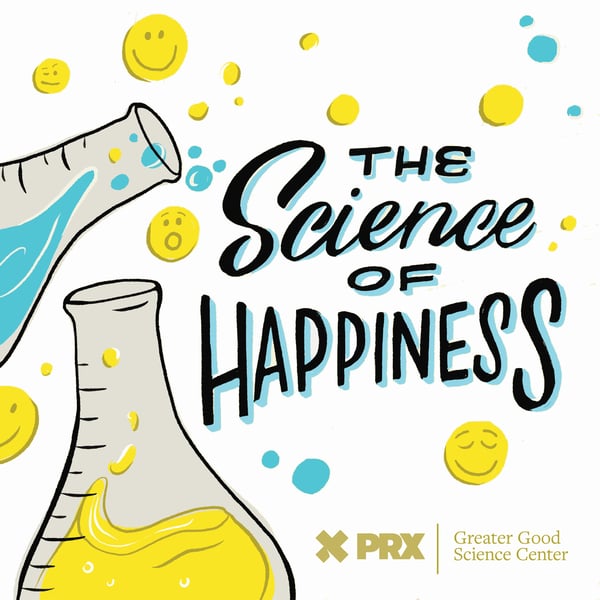Happiness Break: Visualizing Your Best Self in Relationships, With Dacher Keltner
The Science of Happiness
PRX and Greater Good Science Center
4.4 • 1.9K Ratings
🗓️ 28 December 2023
⏱️ 8 minutes
🧾️ Download transcript
Summary
When we imagine our best possible selves in our relationships, we feel more motivated to achieve our goals and a greater sense of control over our lives. This week, Dacher leads a visualization exercise in preparation for the new year.
Join our limited newsletter The Science of Habits to get curated, science-backed tips to help make your New Years resolution stick in 2024.
https://ggsc.berkeley.edu/podcasts/habits
Link to episode transcript: http://tinyurl.com/yj43srye
How to Do This Practice:
Find a comfortable place to begin the practice. Take deep breaths.
Focus on the person you are in a romantic relationship with, or a dear friend. Bring an image of them to mind, like how they look and their mannerisms.
Imagine your life in the future, and how you would like to be the best version of yourself in your relationship with them. Picture yourself interacting with them — what is happening? What are you doing and saying? What is the tone of the interaction?
Repeat this exercise by focusing on friendships and familial relationships. Take note of any common actions across all relationships that you would like to take. Set an intention about how you will interact within your relationships in the new year.
When you’re done, reground yourself in the present moment, focusing on the sensations in your body.
Today’s Happiness Break host:
Dacher Keltner is the host of the award-winning podcast, The Science of Happiness and is a co-instructor of the GGSC’s popular online course of the same name. He’s also the founding director of the Greater Good Science Center and a professor of psychology at the UC, Berkeley.
Check out Dacher’s most recent book, Awe: The New Science of Everyday Wonder and How It Can Transform Your Life: https://tinyurl.com/4j4hcvyt
More resources from The Greater Good Science Center:
How to Find Your Best Possible Self (The Science of Happiness Podcast): https://tinyurl.com/265b34pj
How Thinking About the Future Makes Life More Meaningful: https://tinyurl.com/24mex4by
10 Pillars of a Strong Relationship:https://tinyurl.com/3zffc8x4
For the New Year, Try Imagining Your Best Possible Life: https://tinyurl.com/4carr6kv
We love hearing from you! How do you plan to be your best possible self in the new year? Email us at [email protected] or use the hashtag #happinesspod.
Find us on Spotify: https://tinyurl.com/6s39rzus
Help us share Happiness Break! Rate us and copy and share this link: https://tinyurl.com/6s39rzus
We're living through a mental health crisis. Between the stress, anxiety, depression, loneliness, burnout — we all could use a break to feel better. That's where Happiness Break comes in. In each biweekly podcast episode, instructors guide you through research-backed practices and meditations that you can do in real-time. These relaxing and uplifting practices have been shown in a lab to help you cultivate calm, compassion, connection, mindfulness, and more — what the latest science says will directly support your well-being. All in less than ten minutes. A little break in your day.
Transcript
Click on a timestamp to play from that location
| 0:00.0 | Welcome to happiness break, a series by the Science of Happiness, where we take a break in our day to do practices shown by science to support our wellness and that of those around us. I'm Dacker Keltner. |
| 0:15.9 | When we regularly envision our best possible selves, our biomarkers of stress decrease. we feel more satisfied in general with life, and we |
| 0:26.2 | become more socially connected. So today all lead us through a guided |
| 0:31.0 | contemplation practice where we'll imagine our best possible |
| 0:34.7 | selves in 2024, in particular within the rich dimensions of our social lives. |
| 0:41.8 | Today's practice is based on an influential study by |
| 0:44.6 | psychologist Laura King. When students imagined and wrote about their best |
| 0:49.3 | possible future lives every day for four days. They felt happier, less negative, and even got sick less often. |
| 0:58.0 | So find a comfortable safe place to sit. And let's begin. |
| 1:03.0 | Settle into an upright posture with relaxed shoulders. |
| 1:15.0 | Now let's move into a pattern of deep breathing. |
| 1:20.0 | Let's take a nice deep breath in expanding your chest. |
| 1:27.4 | And as we breathe out, |
| 1:29.1 | let's follow the air through our lungs, |
| 1:30.8 | our throat in our nose. |
| 1:36.0 | Deep breath in. |
| 1:41.0 | And breathing out, notice how the quality of your breath is changing. |
| 1:43.6 | As we continue that pattern of deepening breathing. |
| 1:57.0 | Think of a person of deepening breathing. |
| 2:00.0 | Think of a person you're in a romantic relationship with, or if you're not in a romantic relationship, think of a dear friend. |
| 2:12.0 | I always like in these instances to think of their face, their voice, their |
| 2:17.0 | voice, their mannerisms, what it's like to be near them. |
... |
Please login to see the full transcript.
Disclaimer: The podcast and artwork embedded on this page are from PRX and Greater Good Science Center, and are the property of its owner and not affiliated with or endorsed by Tapesearch.
Generated transcripts are the property of PRX and Greater Good Science Center and are distributed freely under the Fair Use doctrine. Transcripts generated by Tapesearch are not guaranteed to be accurate.
Copyright © Tapesearch 2025.

